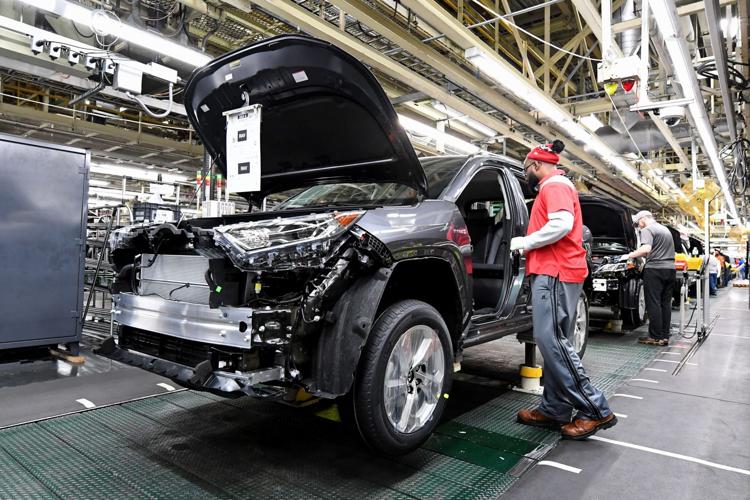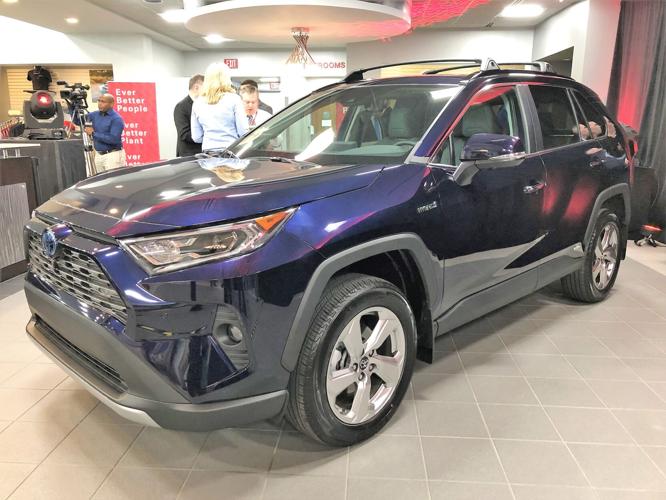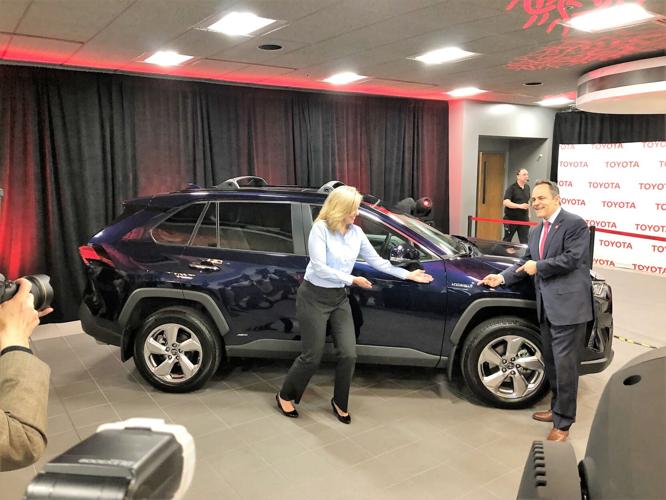LOUISVILLE, Ky. (WDRB) — Toyota's first U.S.-made electric vehicle will start rolling off the line at its Georgetown, Ky. factory in late 2025.
The Japanese automaker said Wednesday that the three-row electric SUV will replace the Rav4 Hybrid SUV and Avalon and Lexus ES sedans, which are slated to leave the plant in 2025.
Toyota declined to reveal the model or other details about the new SUV, such as its pricing.
The automaker sees electrified three-row SUVs as an “growing market segment,” Toyota Motor Manufacturing Kentucky plant manager Susan Elkington told reporters on a call Wednesday morning.
“The three-row SUV market has an expanding market … People are switching more to electrification, as you can really tell with our hybrid Highlanders,” she said.
Sam Fiorani, vice president of global vehicle forecasting at industry consultant AutoForecast Solutions, said Tuesday that his firm predicts the Georgetown plant will make the next generation of Toyota’s crossover EV, the bz4X.
Toyota sells only two pure EVs in the U.S., the bz4X and the Lexus RZ sedan. Those vehicles were a negligible share of the automaker’s U.S. sales in the first quarter of 2023, according to figures released in April.
The vehicle coming to Kentucky will use batteries made at the battery factory Toyota is building in North Carolina, while Elkington said Kentucky employees will assemble the battery packs that go into the EV and its hybrid equivalent.
U.S. assembly of the vehicle and the batteries is likely aimed at capturing the full $7,500-per-vehicle tax credit as well as manufacturer subsidies under President Biden’s Inflation Reduction Act, analysts said.
The Georgetown factory’s current employment of about 9,500 people won’t change as the EV comes online, Elkington said.
Following the change, the factory will continue to make gas-powered and hybrid Camry sedans as well as gas engines and related components for a number of Toyota vehicles.
Employees currently involved in the production of the Rav4, Lexus ES and Avalon will provide the workforce for the new EV, Elkington said.
“Those employees will be the primary source to fill the positions necessary to build both the battery pack and then also the additional work because there’s quite a bit of work difference between a Camry and a three-row SUV,” she said.
'The right time' for EVs at Toyota
While rivals such as General Motors and Ford are plunging headlong into fully electric vehicles, Toyota has been slower to embrace battery-only powertrains. Instead, the company has emphasized more incremental steps toward electrification, such as hybrid and plug-in hybrid vehicles.
“They have certainly taken a much more conservative view of how fast the transition to EVs is going to happen,” said Kevin Riddell, senior manger of powertrain forecasting at LMC Automotive.
General Motors, for example, aims to completely phase out production of gas-powered vehicles by 2035.
Toyota has instead touted its heavy lineup of “electrified” vehicles that use a small amount of battery power to supplement gas engines and improve fuel efficiency.
Electrified vehicles — mainly, conventional hybrids that don’t plug in — made up about 30% of the automaker’s global sales in the fiscal year ended March 31. But fully electric vehicles accounted for only 38,000 of the 9.6 million Toyota and Lexus vehicles sold during the year.
Toyota’s previous longtime CEO, Akio Toyoda, has been openly skeptical of other automakers’ embrace of EVs, saying the electric charging infrastructure isn’t robust and minerals such as lithium for batteries are scarce.
But the automaker has been laying the groundwork for a push into EVs, and some analysts see Toyota moving faster under new CEO Koji Sato, who succeeded Toyoda on April 1.
On May 10, Sato said Toyota would continue its “multi-pathway approach” while accelerating its EV plans, setting a target of 1.5 million EVs by 2026. The company plans to 10 new EV models “ranging from luxury vehicles to compacts and commercial vehicles, mainly in the United States and China,” he said.
The $3.6 billion factory for EV batteries in North Carolina was announced in 2021.
Toyota officials said Wednesday that automaker’s roll out of a U.S.-made EV is just the next step in its “journey” toward electrification rather than a response to competitors.
“I don’t say that we’re behind. I just think that it’s the right time for us to bring these products to market,” Elkington said.
The Georgetown plant could make as many as 200,000 EVs annually, about one third of its total annual vehicle capacity, she said.
But the EVs will be built on a “flex line” that can also produce hybrid vehicles, allowing Toyota to tailor production to market demand, she said. The line can produce any combination of the two vehicle types, she said.
“Battery-electric vehicles are expensive, and not every consumer can buy one,” Elkington said. “But they can make an impact through our other products also, like our hybrids and plug-in hybrids and other options.”
Michelle Krebs, executive analyst with Cox Automotive, said the new SUV is likely to find a market.
"It seems like a lot of people want three-row SUVs, even if they don't use the third row very often," she said.


















